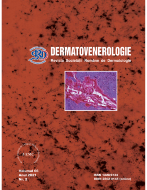Summary
Psoriasis is a chronic recurrent inflammatory dermatosis with genetic and immunological determinism with onset in childhood in about one-third of cases. Although the clinical forms of childhood psoriasis are similar to those of adults, the lesions may differ in distribution, morphology, and onset manner. The positive diagnosis is established based on clinical criteria and histopathological examination. Childhood psoriasis is accompanied by many comorbidities such as obesity, high blood pressure, dyslipidemia, diabetes and juvenile rheumatoid arthritis, and the long-term psychological impact is more pronounced in children and adolescents compared to adults. The absence of treatment guidelines leads to difficult management of pediatric psoriasis, especially of refractory cases that require systemic therapy. The need for an international registry for reporting cases of childhood psoriasis and a standardized assessment of treatment effectiveness and adverse reactions is currently urgently needed. This paper reviews current concepts regarding epidemiology, clinical features, diagnosis, and therapeutic management in childhood psoriasis.


